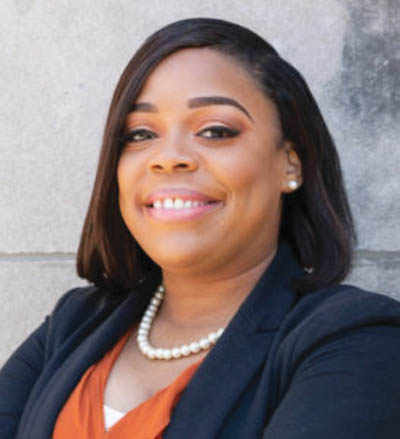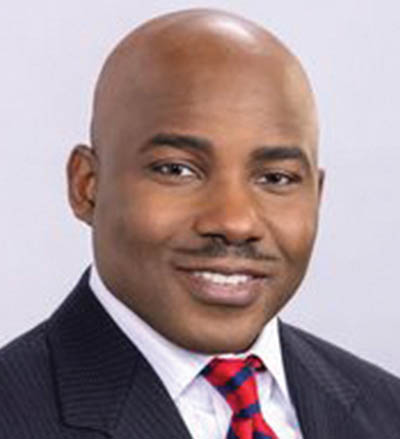By Ava O’Malley

In the 7th Congressional District, which stretches across the city from the Loop out to the western suburbs and down through the South Loop into Bronzeville, two challengers are looking to beat a longtime incumbent in the Democratic primary.

Kina Collins believes poverty is the root cause of crime and noted that, in her neighborhood of Austin, government spends approximately $100 million on incarcerating adults each year. Collins believes money used to keep people in prisons instead should go to improve the community through reopening public schools the City shut down, eliminating food insecurity, and providing affordable, quality housing options.
By recirculating the millions of dollars used to incarcerate, Collins, who has a background in gun violence prevention activism, hopes to prevent crime before it begins.
“After tragedy strikes, we should be talking about lifting the quality of life, and what that looks like is strong public schools; affordable, safe housing; access to quality health care at the point of need; and ability to live with a future free of gun violence,” said Collins.
She supports the Freedom to Vote Act and the John Lewis Voting Rights Advancement Act. She believes that protecting the right to vote requires eliminating obstacles surrounding voting. Collins especially wants to focus on protecting the votes of marginalized communities that are historically suppressed during elections.
“I support making voting a national holiday where people can have the opportunity to vote,” she said. “I think that we should remove barriers across the nation, like voter ID laws and other pieces of legislation that are put into place to limit the ability for people to vote, but also that we should expand early voting by two weeks.”
She also supports voting by mail and favors making the Postal Service better equipped to manage votes by mail.
Collins supports the Affordable Care Act. Her longterm plans include fighting for single-payer Medicare, in which families’ needs are met first and people are not burdened by co-pays, premiums, deductibles, and employer-based health care.
She is a former national organizer for the Physicians for National Health Program, where she led 20,000 physicians, medical students, and healthcare workers in the fight for universal healthcare.
Collins wants to obtain Title I funding for all public schools. She also wants to fight for a livable wage for educators.
“In light of what happened in Texas [Uvalde school shooting], we have to talk about our educators,” Collins said. “We are asking our educators to put their bodies, their lives, everything on the line, and we refuse to pay them a living wage. We refuse to grab their hand and pull them out of the depths of student loan debt, we are refusing to supply them with the resources that they need.”
Instead of arming teachers with guns to protect their students from attacks, Collins believes teachers deserve to be armed with a livable wage, healthcare, mental health services, and supportive school counselors.
Collins also wants to address what she called the devastating effects that former Mayor Rahm Emanuel’s closure of 49 public schools had; 29 of the schools were within the 7th District.
“When we shut down those public schools, when we eviscerate mental health services, it makes it hard for people to have a quality, standard quality of life in these neighborhoods,” she said.
See www.kinacollins.com.

Incumbent Danny K. Davis has represented the 7th District since 1997. He serves on the House Committee on Oversight and Government Reform as well as the Committee on Ways and Means and chairs the Worker and Family Support Subcommittee.
Davis emphasized the link between increasing crime, poverty, lack of education, and diminishing job opportunities.
The 7th District “used to have as many jobs as you could shake a stick at,” Davis said. “Chicago used to be a mecca for work opportunities. Many of those jobs have left the city.”
For the jobs that do remain in divested areas of Chicago, Davis feels many of the residents have not been provided with the tools or opportunities to build necessary skills for employment.
When it comes to preventing crime, Davis favors alternate means outside of policing. He believes his Second Chance Act (SCA), passed in 2008, was integral to reducing crime. The SCA provides support for people exiting incarceration by funding reentry programs and system reforms.
“We have to spend as much time trying to prevent crime as we possibly can,” said Davis.
“And that takes all the resources of a community.”
He also envisions ushering in crime prevention through programs such as the Boy and Girl Scouts of America and other youth development opportunities providing youngsters with alternatives.
Davis supports the John Lewis Voting Rights Advancement Act, which he voted for in Congress. “Protecting the right to vote and promoting the right to vote should be sacrosanct,” he said.
He also supports Medicare For All. Prior to his election to Congress, Davis served as president of the National Association of Community Health Centers, making him well versed in healthcare issues. Davis is proud of the progress he has made with funding hospitals in the district as well as his actions regarding preventive care and health education.
Davis believes in education “from the cradle to the grave” and emphasized the equal importance of strong early childhood education and higher education as well as funding special programs within public schools. Davis also considers himself a champion of legislation regarding colleges legally defined as predominantly Black institutions.
See www.dkdcongress.com for more information.

Denarvis Mendenhall, a West Garfield Park native, said he was raised in a household that emphasized hard work and that his mother, who had ten children and put herself through nursing school, emphasized the importance of education and labor. These values figure prominently in Mendenhall’s plan to serve the 7th District.
He proposes a “hands-on” approach to handling crime, violence, and conflict within the community, believing police officers need to become familiar with the people they pledge to protect and citizens should not feel afraid of reaching out to the police for assistance.
“My platform is simple,” he said. “One: it starts with public safety. I will find funding for conflict resolution programs. Better community policing, where the police officers are walking, knocking on doors, introducing themselves, and distributing their cards. Better education and better options and choices for our youth.”
To Air Force veteran Mendenhall, creating programs that will educate, combat drug use and overdoses, provide jobs and volunteer opportunities, and direct young people away from gang affiliation is a top priority.
While working as a substitute teacher, Mendenhall said, he witnessed the diminished state of Chicago’s public education in the inner city and divested neighborhoods. Mendenhall supports Federal, fiscally neutral funding for schools. The candidate believes applying this equal funding in Chicago will prevent students from having to rely on their area code to receive a quality education. Mendenhall also strongly believes schools should provide all students with breakfast, lunch, and an additional meal to take home at the end of the school day.
“All children should be put on a level playing field,” he said.
Similarly, Mendenhall believes voter protection must be regulated at the Federal level and feels strongly about the fight against voter suppression and bias within political parties. He feels setting up more provisions and regulations for absentee ballots will help protect voters and lead to fair and honest elections.
Mendenhall describes himself as a public servant with more than 25 years of experience working in the government, military, and labor force and a strong believer in healthcare for all—with that healthcare top quality, including pharmaceutical and prescription coverage. A human life should be seen as “far more valuable than a medical bill,” he said.
“I am not going to Washington, DC, to do cocktail lunches and hobnob with lobbyists,” Mendenhall declared. “I’m going to take care of business. I’m going to work for the people. I am progressive, and I am for the working class people, a virtuous working class.”
For more on Mendenhall, see https://ballotpedia.org/Denarvis_Mendenhall.
